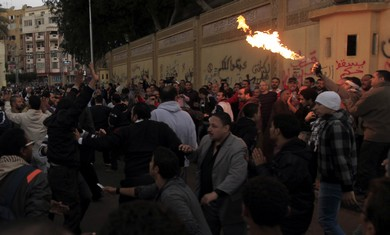Egyptians Battle In The Streets Outside Morsi's Palace

Egyptian Islamists and secular protesters by the thousands battled with fists, rocks and firebombs in the streets around the presidential palace in Cairo for hours Wednesday night in the worst violence since the revolution, The New York Times reported.
According to the Health Ministry, four people have died and 350 wounded in the clashes by Thursday morning.
Four senior advisers to President Mohamed Morsi resigned, blaming him for the bloodshed, and his prime minister pleaded with both sides to pull back in order to make room for “dialogue.”
A presidential source told Reuters Morsi was expected to make a statement later on Thursday. His opponents had earlier called on him to address the nation to help calm the streets.
The scale of the clashes, in the affluent Heliopolis neighborhood just outside the palace, raised doubts about Morsi’s attempt to hold a referendum on Dec. 15 to approve a draft constitution rushed through by his Islamist allies.
Periodic gunshot blasts could be heard at the front lines of the fight, the Times reported, and secular protesters displayed birdshot wounds and pellets. But it could not be determined who -- police or either warring side -- had fired the guns.
Many in both camps wielded clubs, and on the secular side a few carried knives. By 11 p.m., more than 211 people had been injured, the health ministry said. Each side claimed that at least one of its own had been killed.
The riot police tried to fight off or break up the crowds with tear gas, but by about 9:30 p.m. the security forces had all but withdrawn. They continued to try to separate the two sides across one boulevard but stayed out of the battle that raged on all around.
In a city square on the Islamist side of the battle lines, a loudspeaker on the top of a moving car proclaimed, “This is not a fight for an individual, this is not a fight for President Morsi. We are fighting for God’s law, against the secularists and liberals.”
Protesters reportedly set fire to Muslim Brotherhood political offices in the cities of Suez and Ismailia.
"The solution is to go to the ballot box," Mahmoud Ghozlan, a spokesman for Morsi's Muslim Brotherhood, told the Associated Press, asserting the charter was "the best constitution Egypt ever had."
Adding to Morsi's troubles, four of his advisers resigned, joining two other members of his 17-member advisory panel who have abandoned him since the crisis began.
Mohamed ElBaradei, a leading opposition figure, said Morsi's rule was "no different" than Hosni Mubarak's.
"In fact, it is perhaps even worse," the Nobel Peace Prize laureate told a news conference after he accused the president's supporters of a "vicious and deliberate" attack on peaceful demonstrators outside the palace.
"Cancel the constitutional declarations, postpone the referendum, stop the bloodshed, and enter a direct dialogue with the national forces," he wrote on his Twitter account, addressing Morsi.
"History will give no mercy and the people will not forget."
Vice President Mahmoud Mekky, in a bid to calm the situation, said amendments to disputed articles in the constitution could be agreed with the opposition. A written agreement could then go to the new parliament to be elected after the referendum.
"There must be consensus," he told a news conference inside the presidential palace as fighting raged outside on Wednesday evening, saying opposition demands had to be respected.
Prime Minister Hisham Kandil called for calm to "give the opportunity" for efforts to start a national dialogue.
Speaking at NATO in Brussels, U.S. Secretary of State Hillary Clinton said the unrest shows the urgent need for dialogue between Morsi's government and opposing voices on a constitutional path going forward.
"We call on all stakeholders in Egypt to settle their differences through democratic dialogue and we call on Egypt's leaders to ensure that the outcome protects the democratic promise of the revolution for all of Egypt's citizens," she said.
© Copyright IBTimes 2024. All rights reserved.




















